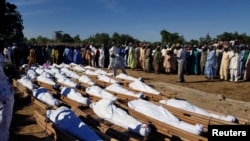Nigerian authorities say they are trying to rescue at least 10 women who were abducted by Boko Haram militants in an attack over the weekend that left at least 43 people dead.
Boko Haram on Tuesday said its fighters killed 78 farmers in the attack, which was condemned by the United Nations and rights groups who are calling for the women to be released.
Nigerian security forces and local militia groups in Borno state are searching for people still missing from the attack, which happened Saturday in the village of Zabarmari.
The U.N.'s Nigeria country director, Edward Kallon, visited the Zabarmari community on Tuesday and met with families of the victims.
Although 43 people were initially reported killed in the attack, the U.N. said searchers had recovered more bodies.
Eve Sabbagh, head of public information at the U.N. Office for the Coordination of Humanitarian Affairs, said that "when such traumatic attacks happen, civilians run and flee in all directions possible, and this is also why it's very difficult for us to confirm the numbers of people who died during the incident but also the number of people missing and what really happened to them.”
Rights group Amnesty International said 10 women were among those still missing.
Nigerian President Muhammadu Buhari said the killing was barbaric and promised more financing would be provided for security agencies to tackle terrorists.
Amnesty International said attacks on civilians have continued because no one is being held responsible.
"We believe that one of the reasons why the crimes have continued is because of lack of accountability. Impunity always leads to further commission of crimes by perpetrators," said Amnesty spokesperson Seun Bakare.
A mass burial was held for the victims on Sunday morning.
Since the attack, the farmers and citizens reeling from the incident have not returned to harvest their farms. Sabbagh said the consequences would be severe.
"We're recording a very high number of people being food insecure and we're extremely worried that next year during the lean season we'll have more than 5 million people facing hunger. This is why the attack on farmers is extremely outrageous,” said Sabbagh.
This week, controversial Boko Haram leader Abubakar Shekau released a video claiming responsibility for the attack and said the group killed 78 farmers, not 43.
Shekau, speaking in a local language, said the attack was retaliation for his men who were captured by farmers and handed to the military.




